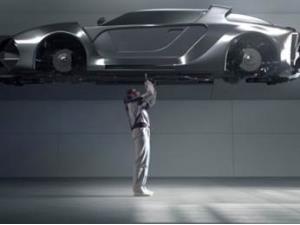



Date:05/09/19
 While automated technologies have certainly lightened the load in car factories around the world, hard labor and long hours on the part of human workers is still a big part of the manufacturing mix. Hyundai has been developing different types of assistive exoskeletons to give its factory workers a helping hand, the latest of which focuses on those tending to overhead tasks.
While automated technologies have certainly lightened the load in car factories around the world, hard labor and long hours on the part of human workers is still a big part of the manufacturing mix. Hyundai has been developing different types of assistive exoskeletons to give its factory workers a helping hand, the latest of which focuses on those tending to overhead tasks.
You could think of Hyundai’s exoskeletons as robots that people can wear to provide support for vital joints and body parts that can be prone to overuse and injury. Its Chairless Exoskeleton, for example, is designed to protect the wearer’s knees, while the Vest Exoskeleton (VEX) is made to reduce pressures on the neck and back.
Today’s announcement is a follow-up to the trial of these two exoskeletons in North America last year, which Hyundai describes as widely successful. The newly upgraded VEX is promised to be a great deal lighter, with Hyundai claiming its total weight of 2.5 kg (5.5 lb) is up to 42 percent lighter than competing products.
Hyundai says this low weight is due to the absence of a battery, with the VEX instead relying on a spring-based system that offers six degrees of force assistance and still allows for a full range of motion. It is worn like a backpack with Hyundai workers slipping their arms through the shoulder straps to take on overhead tasks like fitting brake tubes and exhausts from the underside of the vehicles.
“VEX gives workers greater load support, mobility, and adaptability when operating in overhead environments,” stated DongJin Hyun, head of Robotics team of Hyundai Motor Group. “Workers will also appreciate how light VEX is to wear and work with.”
Hyundai says it is weighing up a worldwide rollout of VEX, and expects it to go into commercial production by year’s end. You can check out the promo video below.
Hyundais Vest Exoskeleton eases the burden of overhead tasks
 While automated technologies have certainly lightened the load in car factories around the world, hard labor and long hours on the part of human workers is still a big part of the manufacturing mix. Hyundai has been developing different types of assistive exoskeletons to give its factory workers a helping hand, the latest of which focuses on those tending to overhead tasks.
While automated technologies have certainly lightened the load in car factories around the world, hard labor and long hours on the part of human workers is still a big part of the manufacturing mix. Hyundai has been developing different types of assistive exoskeletons to give its factory workers a helping hand, the latest of which focuses on those tending to overhead tasks.You could think of Hyundai’s exoskeletons as robots that people can wear to provide support for vital joints and body parts that can be prone to overuse and injury. Its Chairless Exoskeleton, for example, is designed to protect the wearer’s knees, while the Vest Exoskeleton (VEX) is made to reduce pressures on the neck and back.
Today’s announcement is a follow-up to the trial of these two exoskeletons in North America last year, which Hyundai describes as widely successful. The newly upgraded VEX is promised to be a great deal lighter, with Hyundai claiming its total weight of 2.5 kg (5.5 lb) is up to 42 percent lighter than competing products.
Hyundai says this low weight is due to the absence of a battery, with the VEX instead relying on a spring-based system that offers six degrees of force assistance and still allows for a full range of motion. It is worn like a backpack with Hyundai workers slipping their arms through the shoulder straps to take on overhead tasks like fitting brake tubes and exhausts from the underside of the vehicles.
“VEX gives workers greater load support, mobility, and adaptability when operating in overhead environments,” stated DongJin Hyun, head of Robotics team of Hyundai Motor Group. “Workers will also appreciate how light VEX is to wear and work with.”
Hyundai says it is weighing up a worldwide rollout of VEX, and expects it to go into commercial production by year’s end. You can check out the promo video below.
Views: 482
©ictnews.az. All rights reserved.Similar news
- Azerbaijani project to monitor disease via mobile phones
- Innovative educational system to be improved under presidential decree
- NTRC prolongs license of two TV and radio organizations for 6 years
- Azerbaijan establishes e-registry for medicines
- Azerbaijani museum introduces e-guide
- Nar Mobile opens “Nar Dunyasi” sales and service center in Siyazan city
- International conference on custom electronic services held in Baku
- OIC secretary general to attend COMSTECH meeting in Baku
- Azerbaijan develops earthquake warning system
- New law to regulate transition to digital broadcasting in Azerbaijan
- Azerbaijani State Social Protection Fund introduces electronic digital signature
- Intellectual traffic management system in Baku to be commissioned in December
- Tax Ministry of Azerbaijan started receiving video-addresses
- World Bank recommends Azerbaijan to speed up e-service introduction in real estate
- Azerbaijan to shift to electronic registration of real estate





















